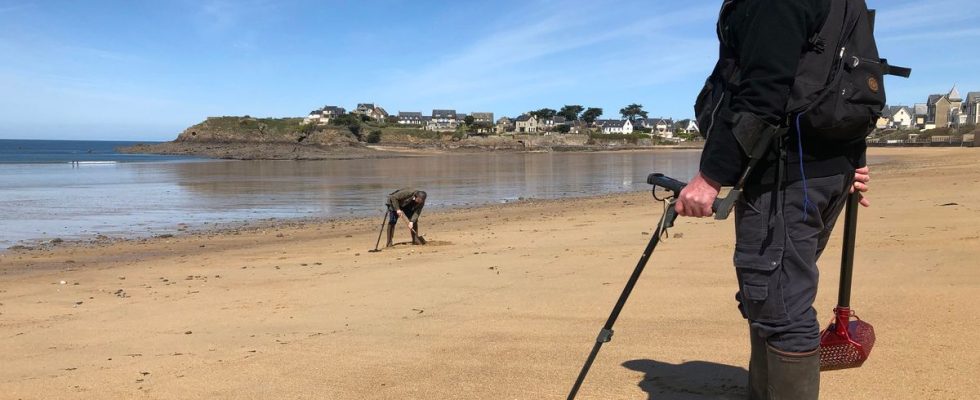“Do you hear that shrill sound? It’s probably aluminum. The sound is deeper when it’s iron. The helmet screwed on the ears, Étienne listens religiously to the sounds picked up by the disc of his metal detector. With his two colleagues, this Breton retiree takes advantage, in this month of April, of a beautiful sunny day and low tide to indulge in his passion on the beach of Minihic, in Saint-Malo. “We’ll see if we find something, but that’s not the most important thing,” he says. We especially take the opportunity to take a breath of fresh air, clear our heads and share a friendly moment with friends. »
Like them, about 120,000 people regularly handle the “frying pan” in France. Detectorists, or UDM (users of metal detectors), who always arouse curiosity on the beaches or in the fields. But they are also in the crosshairs of archaeologists, who accuse them of looting certain sites and of trafficking in ancient coins and other historical objects.
“It’s rare to find interesting things”
President of the French Metal Detection Federation, which has about 2,000 members, Marc Méreaux does not hide the fact that some ill-intentioned people practice this activity, only motivated by the lure of profit. “There are bad apples, like everywhere in society, indicates this former major of the gendarmerie. But we are not treasure hunters. These people are only a minority and they harm the whole community. »
Because to hear them, the detectorists do not see their passion as a frantic treasure hunt. “You shouldn’t believe it, but it’s extremely rare to find interesting things,” says Jean-Paul, Étienne’s colleague. Almost all the time, it’s crap that we find, waste like metal cans, capsules or tabs of aluminum cans. These metal prospectors also claim that they play an important role in soil depollution. “If we go out once a week, we can easily pick up a hundred kilos of waste a year. »
A highly regulated practice
It still happens sometimes that UDMs come across something other than bullshit. Individuals ask them to find a jewel or a valuable object lost in a garden or on a beach. “I found a gold signet ring once, in Saint-Malo, says Etienne. People were thrilled and that was enough to make me happy. Because I don’t do this for the money but for the pleasure of finding lost things. The three enthusiasts are also regularly called by farmers who have lost a plow base or parts of their tractor. “We also intervene to remove bits of wire to prevent the animals from hurting themselves,” says Jean-Paul.
These enthusiasts therefore defend tooth and nail the interest of their hobby, too often stigmatized according to them. Especially since the practice is highly regulated. A little too much, moreover, in their eyes. Since 2016 and the modification of the Heritage Code, the legislation has indeed become even tougher. “They apply the same rules to us as for archeology even though it’s a hobby”, defends Marc Méreaux.
The president of the federation pleads for a model like in the United Kingdom, Denmark or Finland, where the practice is fully recognized. “We would like to be able to declare the objects that we find, but we cannot do so because the use of a metal detector means that they were not discovered by chance, underlines Marc Méreaux. We even risk being prosecuted if we declare a found object, so it dissuades people from doing so. It is a huge loss for the heritage. “Basically, it’s legal if you can’t find anything, but illegal as soon as you find something,” summarizes Jean-Paul.

